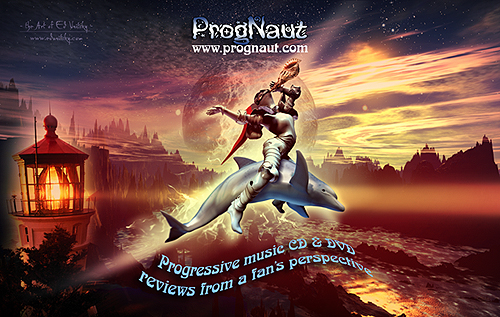“Fabric Of Space Divine” is the follow-up to Daymoon's well received 2012 release “All Tomorrows” (which was favorably reviewed here by Ron Fuchs in January of 2012). And after reading Ron's review as well as a variety of others in the preparation of writing my review for “Fabric Of Space Divine” I must assume this album is a total departure from “All Tomorrows”, because its so far removed from anything you're likely to hear from the likes of The Flower Kings, Eloy, Spock's Beard, or Queen. Although quirky elements of Giles, Giles and Fripp can be detected on occasion. All bands mentioned in response to the release “All Tomorrows”.
For the most part “Fabric Of Space Divine” is a very serious-minded composition which combines elements of traditional classical music, filmscore, ethnic World music, jazz, funk, avant-garde, and progressive rock. And lyrically the subject matter of this concept album is quite ambitious.
Daymoon has something of a confusing history in that the first two albums, which were essentially solo albums from Portuguese artist Fred Lessing, have yet to be officially released. Lessing began recording the projects in the late 90s' and completed “Tales From The Earth” in 1998 and “Orion” in 2000. His third solo album, “Chronicles (2002) was eventually released – also under the moniker Daymoon. Yet all three albums are considered Fred Lessing solo projects, with an assist from guest musicians.
But in 2009 Lessing assembled a core group of musicians and finally produced the first official band release by Daymoon, “All Tomorrows”. The album was released on the Russian label MALS; with considerable assistance from Andy Tillison of The Tangent, who performed as keyboardist on several tracks as well as co-producer and mastering the disc.
So depending upon your math, and what should be added to - or subtracted from the Daymoon discography – this is either the fifth album from Daymoon, or the second as a band.
The expansive line-up for Daymoon on “Fabric Of Space Divine” consists of the core band: Fred Lessing (guitars, woodwinds, vocals, keyboards, and ethnic instruments), André Marques (acoustic & electric drums, keyboards, and backing vocals), Bruno Evangelista (lead vocals, guitars, and keyboards) and Renato Bonfim (bass guitar, guitar, and backing vocals); as well as the extended band for studio and larger venues which also includes: Paulo Catroga (keyboards, guitar and backing vocals), Joana Lessing (keyboards, percussion, and backing vocals), and Adriano Pereira (reeds, woodwinds, percussion, guitar, and backing vocals). Also appearing on the album are a number of global guest performers which include: Luís Estorninho (bass guitar), Fernando Guiomar (guitars), Michael Dorp of Flying Circus (vocals), Hugo Flores of Factory of Dreams, (vocals), Helena Madeira (Celtic harp), Vasco Patrício (guitar), and Jeff Markham (vocals).
The music on “Fabric Of Space Divine” is a true aural potpourri of styles and sonic textures ranging from a hybrid funky yet exotic middle-eastern track “Beyond Nature”, which might easily have been on the Prince album “Around In The World In A Day”, to the progressive track “Digital”, complete with the polyphonic madrigals and the complex Baroque/progressive rock styling of Gentle Giant. While the unlikely titled “Ice Prospector” has a decidedly Calypso island ambiance, complimented by steel drums. And the tracks “Beyond” and “Grasping The Fabric” which segue into one another are cinematic orchestral compositions that bring to mind Amin Bhatia's sci-fi themed concept album “Interstellar Overdrive”. The tracks are epic and grandiose. And “Twisting The Fabric” infuses the unlikely pairing of The Cars and Van Der Graaf Generator into the tune, which also echoes the powerfully emotional track “Keeper Keep Us”, as sung by Meatloaf, from the 1977 concept album “Intergalactic Touring Band”.
“Fabric Of Space Divine” is an ambitious and very heady concept album penned by Fred Lessing, and inspired by Stephen Baxter's Maifold books (ramblings on Darwinistic monotheism and the history of the universe). And Lessing adds that while some of the ideas and lyrical notions in his musings may sound far-fetched, constant advances in bioengineering, nanotechnology, and so forth make these not too distant ideas a tad more plausible.
Like I said … it's a very heady concept album – but well worth the journey.
Lyrically, progressive rock is an expansive genre where imaginative flights of fancy, introspective musings and philosophical notions, science fact and fiction, religious dogma, and the everyday foibles of the common man intersect. No topic is taboo - or performance too pretentious. As a matter of fact it's often encouraged … then afterward ripped to shreds by critics for being too pretentious and overblown.
We may not always understand or agree with the message … but in the case of “Fabric Of Space Divine” - even if you find the content of the messaging indigestible, the musical compositions and extraordinary musicianship makes the album a culinary delight to be enjoyed again and again.
Highly recommended.
Reviewed by Joseph Shingler on July 24th, 2013

